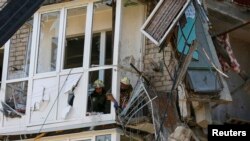German Chancellor Angela Merkel says Russia has not done enough to bring peace to eastern Ukraine, as EU leaders prepare to meet in Brussels to decide whether to toughen sanctions against Moscow.
Also Wednesday, White House spokesman Josh Earnest said Russia has not taken the necessary steps to de-escalate the situation in Ukraine.
The United States and its European allies accuse Russia of arming pro-Russian separatists in eastern Ukraine. They have demanded the Kremlin stop the cross-border flow of fighters and military hardware, threatening broader sanctions if it fails to do so.
The Pentagon says it is increasingly concerned about Russian military forces massed on the border with Ukraine. It confirmed NATO estimates that 10,000 to 12,000 Russian troops are deployed there, adding the force "certainly has the capability to conduct operations on either side of the border."
Tensions between Moscow and Kyiv escalated Tuesday after a top Ukrainian defense official warned the country faced an imminent Russian military attack and Ukraine's security chief said he had "absolute proof" Russia was involved in the downing of a Ukrainian military transport plane a day earlier.
Later Tuesday, 11 people were killed in an airstrike that destroyed an apartment building in the eastern Ukrainian town of Sniznhe. Pro-Russian separatists blamed Ukraine's air force for the attack, while a Ukrainian military spokesman, in a thinly veiled accusation against Russia, called the airstrike a "cynical provocation."
Chancellor Merkel discussed the situation in Ukraine with U.S. President Barack Obama in a telephone call late Tuesday. According to the White House, the two leaders "reaffirmed their commitment to work together with other allies to ensure Europe and the United States remain closely coordinated on measures to impose costs on Russia, as necessary, as well as to continue to support Ukraine’s long-term stability and prosperity."
Merkel and Obama had separate telephone calls Tuesday with Ukrainian President Petro Poroshenko.
Suspending investments
The 28-nation EU has been under strong pressure from the U.S. and Ukraine to take a hard line against Russia.
The EU leaders will ask the bloc's bank, the European Investment Bank (EIB), to suspend financing of new public sector projects in Russia, the draft statement said.
EU countries will work together within the European Bank for Reconstruction and Development (EBRD) to suspend EBRD financing of new projects in Russia, it said.
EU diplomats say taking action at the EBRD will be complicated as Russia is one of 64 countries that are shareholders of the bank.
Russia has traditionally been the biggest recipient of the London-based EBRD's funds - the bank lent 1.8 billion euros ($2.44 billion) there last year. The EIB pledged to lend more than one billion euros to Russia last year.
The EU will broaden the scope of asset freezes to target companies and other organizations “that are supporting materially or financially actions undermining or threatening Ukraine's sovereignty, territorial integrity and independence,” according to the draft statement.
If broadly interpreted, that change could have wide ramifications, potentially allowing the EU to target a range of Ukrainian or Russian companies.
The EU has so far imposed asset freezes on 72 people and two energy companies in Ukraine's Crimea region, which was annexed by Moscow earlier this year.
It has drawn up a list of hard-hitting sanctions on sectors of the Russian economy, but has held back from imposing them because some EU governments are wary of potential retaliation from Russia, the bloc's biggest energy supplier.
The White House's willingness to punish Russia without European backing comes as the Obama administration faces criticism that its repeated warnings about tougher sanctions are little more than empty threats.
"Sometimes I'm embarrassed for you, as you constantly talk about sanctions and yet, candidly, we never see them put in place," Sen. Bob Corker, R-Tenn., said during a Senate hearing on Ukraine with administration officials last week.
Obama administration officials argue that the sanctions that have been levied have had an impact on Russia's economy, citing International Monetary Fund statistics showing a downgrade in Russia's growth this year.
However, officials have acknowledged that the sanctions have not had an impact on Putin's decision-making in Ukraine.
State Department spokesman Jen Psaki said Tuesday that if Putin "cares deeply about his people, about the economy, his own country" the sanctions would shift his calculus
Regional cooperation programs
The EU leaders will also ask the EU's executive Commission to look into suspending EU bilateral and regional cooperation programs that benefit Russia. Projects dealing exclusively with civil society will be excluded, the draft said.
Some 450 million euros of EU funding are set to flow to Russia between 2014 and 2020 under various cooperation programs, according to the EU Commission.
The EU leaders will also ask officials to draw up proposals for further measure to restrict investment in Crimea, whose annexation by Russia is not recognized by the EU.
The leaders will say they expect international financial institutions not to finance any project that recognizes the annexation of Crimea, according to the draft, which could still be changed following leaders' discussions.
Some information for this report provided by Reuters and AP.






